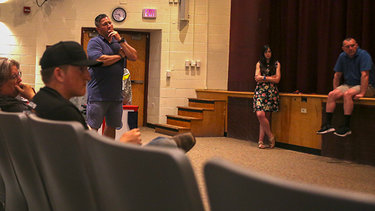Berne-Knox-Westerlo loses budget revote gamble and is forced into contingency plan, cutting over $560K
HILLTOWNS — Berne-Knox-Westerlo has again failed to get enough voters on board with next year’s $26 million budget, which carried a 5.1 percent tax increase, and now will have to make do with its current $11 million levy under its first contingency budget in over a decade.
With 789 for and 573 against — for a total of 1,362 voters, which is highly unusual for the rural district, and up from 588 last month — the district fell a little over 2 percentage points short of the 60-percent approval rate it needed to push the budget through over the tax cap.
After failing to reach that threshold by just eight votes last month, the board of education gambled and, rather than cutting the less than $100,000 it would have needed to come in under the tax cap and pass with a simple majority, put the same budget up again. This time, it failed by 28 votes.
Board member Matthew Tedeschi had boasted after the first failure that the revived budget would “pass by 150 votes.”
“What we’re doing is winning,” he had said.
On Tuesday night, the mood was somber in the school auditorium as the votes were tallied.
“It looks like we’re going to a contingency plan,” said Tedeschi as the outgoing superintendent, Timothy Mundell, and his newly named replacement, Bonnie Kane, currently the secondary principal, both looked shocked.
The handful of onlookers were subdued and largely silent.
More than a score of students in the district had written letters to the Enterprise editor over the last few weeks, urging residents to vote in favor of the budget to keep their favorite programs from being cut.
At its final meeting before the second vote, Mundell said that a contingency budget would create a $563,114 deficit, listing the following as potential reduction areas:
— Three full-time teachers’ assistants/aides;
— Two full-time teachers;
— A late bus run;
— The deputy treasurer stipend;
— Employee benefits;
— Non-union employee salary increases;
— A graduation ceremony at The Egg;
— School resource officer program;
— Bulldog Club;
— Field trips;
— Equipment;
— Maintenance projects;
— Transportation for students within two or three miles from the school, depending on grade level;
— Co-curricular clubs;
— Sports;
— Ready-Set-Go program;
— Chaperoned events;
— Summer student help;
— Community use of facilities;
— Supplies in all areas;
— Information technology support;
— Contract teaching; and
— Overtime and extra wages for staff.
While the board would not be required to cut all or even most of these things, the audience was warned that it would “not be just one or two things.”
Board president Kimberly Lovell said that the board had not yet discussed what a contingency budget would look like. A statement on the district website says that conversation will be held at an upcoming meeting.
Despite the large turnout, which indicates a significant amount of canvassing on both sides of the issue, the board meetings before and after the first failed vote drew few critical voices. The last two meetings were instead packed with supporters.
If this had any bearing on the board’s decision to re-up the budget proposal, statewide revote data from the past several years would have reinforced that optimism. Of the seven district budgets that went to a revote for the 2022-23 school year, six passed, including two that needed a supermajority. The one that failed needed only 50 percent.
Of the 16 budgets that were up for a revote for the 2018-19 school year, only three failed, and none of them had needed a supermajority.
The contingency is especially poorly timed since it will fall on the shoulders of the newly-appointed superintendent, Kane, who is taking over for Mundell at the end of June, when he begins his retirement.
Mundell had played an important role in stabilizing the district over his roughly 10 years there, building out not just its infrastructure and programming, but the culture of unity that has just now been punctured.



